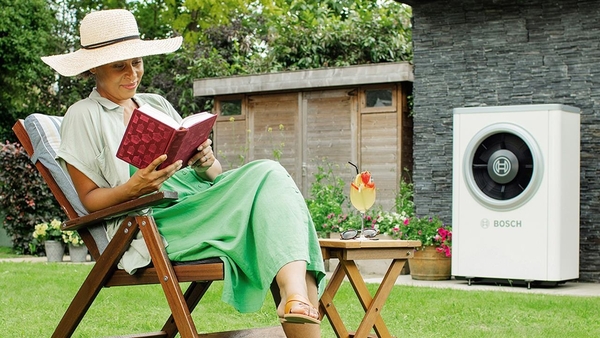AOS Blog

Air Source Heat Pump Noise Levels at Night: What to Expect
Air source heat pumps are an increasingly popular choice for homeowners looking to save on energy bills while reducing their carbon footprint. But one common concern that arises when considering this technology is the noise levels, particularly at night when your surroundings are quieter. If you're thinking about getting a heat pump installed, it's important to understand how these systems work and what you can expect in terms of sound.
In this post, we’ll explore the noise levels of air source heat pumps, how they perform at night, and tips to reduce any potential disturbance. Whether you’re simply curious or actively seeking a heat pump installer in Newmarket, this guide will provide you with key insights.
How Noisy Are Air Source Heat Pumps?
One of the most significant questions for homeowners considering air source heat pumps is how noisy they are. Like any mechanical system, heat pumps do produce sound, but the noise level can vary depending on the make, model, and installation. Most modern air source heat pumps are designed to operate quietly, with an average noise output of between 40 to 60 decibels. To give you some context, 40 decibels is comparable to the hum of a refrigerator, while 60 decibels is about the level of normal conversation.
However, when it comes to night-time noise, the quieter surroundings can make even low-level sounds more noticeable. Therefore, if you're concerned about sound during the night, it's important to know how to manage and mitigate any disturbance.
Noise Levels at Night: What to Expect
During the day, ambient noise from traffic, appliances, and daily activities often masks the sound of a heat pump. But at night, when everything is quieter, the noise might become more noticeable. This is especially true in rural or suburban areas where there is little to no background noise.
However, it’s important to note that heat pumps are generally quieter than traditional heating systems, such as boilers or air conditioners. They are designed with insulation and low-noise fan technology to minimise sound, and many models come with “night mode” settings, which reduce fan speed to lower the noise output even further.
If you are considering having a heat pump installed, it’s worthwhile to discuss with your installer about how the unit will be positioned to avoid potential disturbances at night. A good installation should take into account the location of bedrooms, neighbouring properties, and local noise regulations to ensure that your heat pump operates quietly.
Factors That Affect Noise Levels
There are several factors that can influence how loud your heat pump sounds at night. These include:
1. Placement of the Unit
One of the biggest factors is where the outdoor unit of the heat pump is installed. Installing it too close to a bedroom window or neighbouring property may make the sound more noticeable, especially at night. An experienced heat pump installer in Newmarket will carefully consider placement to minimise noise disruption. Installing the unit on a solid, stable surface can also help reduce vibration noise.
2. Type of Heat Pump
Not all heat pumps are created equal. Some models are designed to be quieter than others, especially premium models with additional noise-reduction features. If you live in a particularly quiet area or are sensitive to noise, investing in a heat pump with a lower decibel rating could be a wise decision.
3. Seasonal Performance
Heat pumps work by transferring heat from the outside air into your home. During colder weather, they may need to work a little harder, which can slightly increase the noise level as the fan speed increases. However, many units have settings to automatically adjust the fan speed at night, which helps to maintain quieter operation.
4. Age and Maintenance
Like any system, the noise from an air source heat pump can increase if the unit is not well maintained. Regular servicing is key to keeping the system running efficiently and quietly. If you're thinking about getting a heat pump, it’s worth considering a maintenance plan to keep your unit in top condition and avoid any unexpected increases in noise over time.
How to Reduce Heat Pump Noise at Night
If you're concerned about potential noise from your air source heat pump, there are several steps you can take to minimise it:
• Strategic Placement: As mentioned earlier, working with an experienced installer to find the best location for your heat pump is crucial. Avoid placing it near bedrooms or close to neighbouring properties where it may be more noticeable at night.
• Sound Barriers: Installing a barrier, such as a fence or hedge, between the heat pump and your home can help absorb and deflect sound, making it less noticeable. Just ensure the barrier does not obstruct airflow to the unit.
• Use Night Mode: Many air source heat pumps come with a night mode or quiet mode option. This reduces the fan speed and compressor activity during the night, which in turn lowers the noise output.
• Regular Maintenance: Keeping your heat pump well-maintained ensures it runs efficiently and quietly. Regular servicing can help identify any potential issues before they become problematic.
Conclusion
Air source heat pumps are designed to provide efficient heating with minimal noise, but it’s understandable that you might be concerned about how they perform at night. The good news is that most modern systems are very quiet, especially with features like night mode to reduce sound levels further. With proper installation and regular maintenance, an air source heat pump should not disturb your household or neighbours during the night.
If you’re ready to upgrade to an energy-efficient heating solution, working with a reputable heat pump installer in Newmarket will ensure that your system is installed in the most optimal way to reduce noise and maximise comfort all year round.





